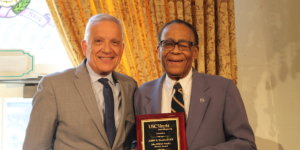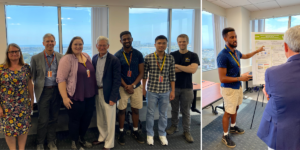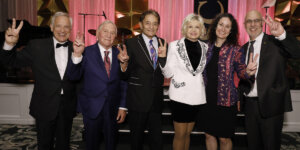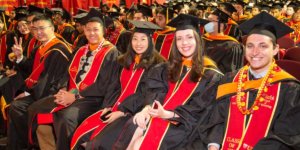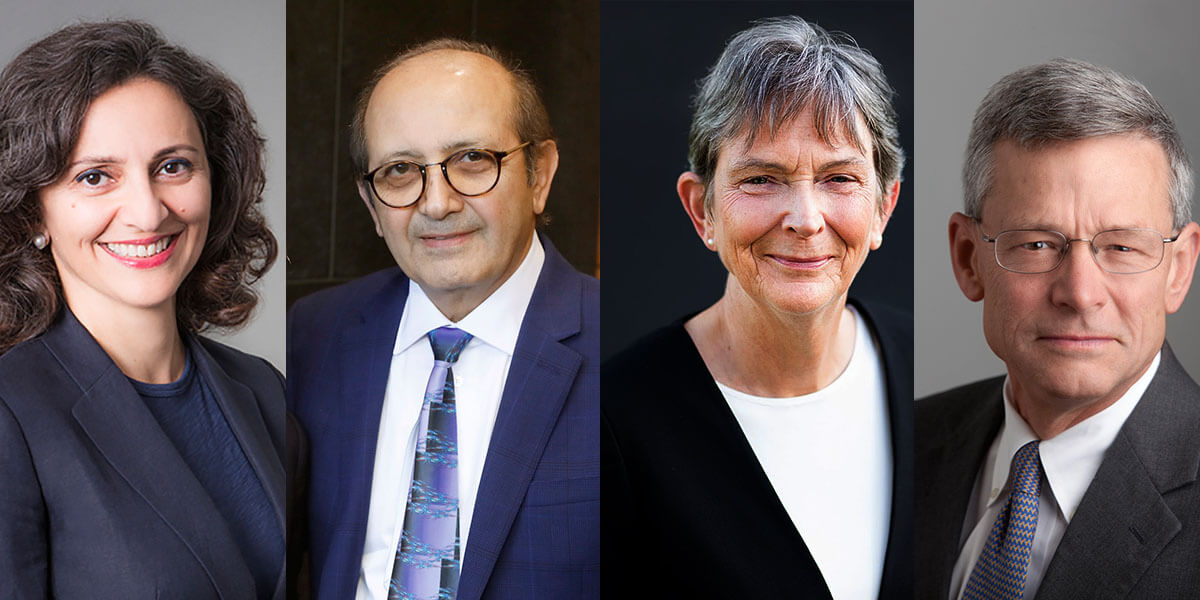
New NAE members at USC Viterbi include (from left to right): professors Mahta Moghaddam, Behrokh Khoshnevis, Gen (Ret.) Ellen M. Pawlikowski and USC Provost Charles Zukoski.
She uses satellites to gaze deep below the soil. His robots may 3-D print homes in a single day.
She’s a four-star general, a leader in national security programs. He’s a leader in higher education, a trailblazer in nanoparticles
Together, they represent the four newest members of the National Academy of Engineering (NAE) on the faculty of the USC Viterbi School of Engineering.
Mahta Moghaddam, the William M. Hogue Professor of Electrical Engineering in the Ming Hsieh Department of Electrical and Computer Engineering, and Behrokh Khoshnevis, the Dean’s Professor of Industrial and Systems Engineering in the Daniel J. Epstein Department of Industrial and Systems Engineering, were inducted as members of the National Academy of Engineering on October 6, 2019.
They are joined by two new faculty — already NAE members — who joined USC Viterbi in fall 2019.
Gen (Ret.) Ellen M. Pawlikowski, whose appointment at the USC Viterbi School of Engineering became effective this semester, is a Judge Widney Professor, a title named for one of USC’s founders, Judge Robert Maclay Widney, and reserved at USC for eminent individuals from the arts, sciences, professions, business, and community and national leadership. She was elected to the NAE in 2014.
Charles F. Zukoski, the university’s provost and senior vice president for academic affairs, joined USC on Oct. 1. He holds the Shelly and Ofer Nemirovsky Provost’s Chair and joins USC Viterbi’s faculty as a professor of chemical engineering and materials science and biomedical engineering. A skilled administrator, researcher and member of the National Academy for Engineering (2007), Zukoski had been provost and executive vice president for academic affairs at the University at Buffalo.
“Election to the National Academy of Engineering is one of the highest professional honors for an engineer,” said USC Viterbi Dean Yannis C. Yortsos. “Behrokh and Mahta join 84 other new NAE members elected in 2019. And we are honored to welcome Ellen and Chip, two other members of the NAE, to our faculty.”
There have been 12 NAE members elected from USC Viterbi since 2008.
Moghaddam, who also serves as the director of new research initiatives at USC Viterbi and president of the IEEE Antennas and Propagation Society, was recognized for her work in the development of physics-based computational algorithms for mapping of subsurface characteristics.
Khoshnevis, who also has courtesy appointments in Aerospace and Mechanical Engineering, Astronautical Engineering, and Civil and Environmental Engineering, was recognized for his pioneering contributions to large-scale 3-D printing in construction.
USC interim President Wanda M. Austin said that Moghaddam and Khoshnevis were two of the university’s brightest stars. She said that Khoshnevis also had the distinction of having been her thesis advisor.
“But really, it is I who has the distinction of having been his doctoral student. To say Behrokh’s creativity and vision are extraordinary is an understatement,” Austin said.
Austin said that the key to Moghaddam’s life’s work was her unparalleled imagination about how to use microwave energy for the common good.
“Her focus has come down to two things: Saving the planet, and saving people,” Austin said.
Moghaddam said she was humbled and grateful to have been elected to the NAE.
“As I was going through the list of the colleagues elected this year to the NAE, I came across the name of a former middle school class-mate of mine back in Iran. I thought “what a coincidence” but also thought about the fact that achievements are not possible without the influence of places, events, and people. Sometimes things are just not coincidences,” Moghaddam said.
“I hope to be able to do my part to inspire and support, and to do all I can to live up to your expectations and the expectations of this wonderful institution that is USC, and of course, USC Viterbi,” she said.
Khoshnevis said that when he first embarked on his career, he faced a choice between his three loves: arts, sciences and technology.
“After over three decades of practicing engineering, I came to the realization that I neither parted with art nor with science, because in the pursuit of inventive ideas in my engineering practice, I recognized that art, science and technology are all central to the process of invention,” he said.
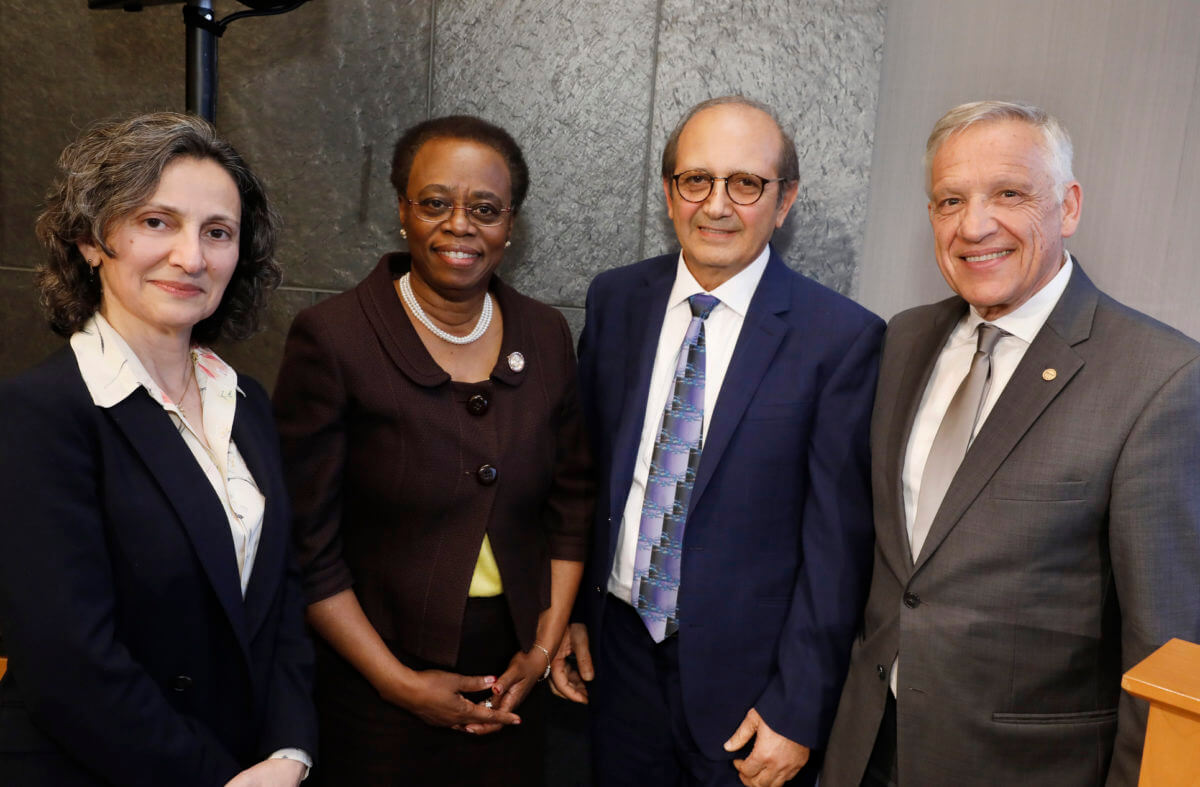
MAHTA MOGHADDAM, LEFT, WITH USC INTERIM PRESIDENT WANDA M. AUSTIN, BEHROKH KHOSHNEVIS AND USC VITERBI DEAN YANNIS C. YORTSOS.(PHOTO/STEVE COHN)
As director of the Microwave Systems, Sensors, and Imaging Lab (MiXIL), Moghaddam’s research touches on a wide range of problems. Her lab has designed and used microwave systems to, among other things, target and treat breast cancer, retrieve information about the earth’s surface and subsurface, and conduct large-scale environmental mapping.
Moghaddam is also director of the Viterbi Innovation Fund Arid Climates and Water Research Center (AWARE), which brings researchers from across USC Viterbi and the wider university community together to better understand and address water in arid climates. Moghaddam’s center seeks to establish USC as the largest university in the largest water-scarce urban center in the world and the leading university in the nation addressing issues of water scarcity.
Joining USC in 1983, Khoshnevis now holds over 100 U.S. and international patents, mostly related to 3-D printing. He is a member of the National Academy of Inventors and the Director of the Center for Rapid Automated Fabrication Technologies (CRAFT).
Khoshnevis has pioneered the Contour Crafting technology, which has resulted in the creation of an entirely new industry in construction. In 2017 he founded the Contour Crafting Corporation, a USC spinoff, applying 3-D printing to the construction industry.
The Four-Star Air Force General
Pawlikowski, who is currently a member of the Raytheon Company Board of Directors, served for over 40 years in the military, reaching the rank of four-star general, only the third woman to achieve the highest rank in the Air Force.
She has a bachelor of science degree in chemical engineering from the New Jersey Institute of Technology, and a Ph.D. in chemical engineering from the University of California, Berkeley. General Pawlikowski’s career has spanned a wide variety of technical management and leadership positions. In her last assignment, she served as the Commander of Air Force Materiel Command at the Wright-Patterson Air Force Base. General Pawlikowski oversaw all Air Force technology development, aircraft systems and sustainment, and installation management; leading 80,000 people with an annual budget of $60B. She is nationally recognized for her leadership in the science and engineering community, is a member of the National Academy of Engineers and an Honorary Fellow of the American Institute of Aeronautics and Astronautics.
“General Pawlikowski is an extraordinary person who has dedicated her life to serving her country. Her contributions in science and engineering are equally impressive,” said USC President Carol L. Folt. “I am excited about the role she will play in the formation of the next generation of military leaders by engaging with USC’s ROTC programs, and share her experiences with our student veterans as they transition to civilian leadership roles.”
At USC Viterbi School of Engineering, she will initially co-teach a Systems Architecting and Engineering (SAE) course with Professor Azad Madni, with a specific emphasis on systems architecting case studies. Starting this fall, she will teach the systems architecting and engineering case studies course. While on campus, she will also play a role in the formation of the next generation of military leaders by engaging with USC’s ROTC programs, and share her experiences with USCs student veterans as they transition to civilian leadership roles.
Regarding General Pawlikowski’s appointment, Yannis C. Yortsos, Dean of the USC Viterbi School of Engineering, said, “We are delighted to welcome General Ellen Pawlikowski to our faculty. Her expertise in complex systems and in the architecting of new processes will be of invaluable help to our educational and research endeavors. Her remarkable accomplishments make her an outstanding role model for all our students.”
The New Provost – A Renowned Chemical Engineer
Zukoski, the second-ranking administrator at USC, the provost oversees all academic programs at the university, the 23 professional schools and units and educational policies. He will manage the divisions dedicated to academic and faculty affairs, student affairs, admission and enrollment research, campus well-being, global initiatives, libraries and museums, among others.
“USC is a fabulous educational and research institution. I’m excited to work closely with President Folt, the deans, faculty and students to grow the academic excellence that is inherent to USC. This is a pivotal time in USC’s history,” he said.
In addition to his administrative expertise, Zukoski is well-known for his research program focused on the suspension of nanoparticulates in solution, studying how to grow or synthesize particles that are uniform in size and examining how they can change the characteristics of various materials.
Zukoski’s research has earned him numerous honors, including being named one of the 100 Chemical Engineers of the Modern Era by the American Institute of Chemical Engineers. He has nearly 150 peer-reviewed publications.
Zukoski earned his Ph.D. in chemical engineering from Princeton University and his bachelor’s degree in physics from Reed College.
Published on November 8th, 2019
Last updated on September 16th, 2020






